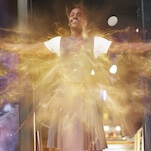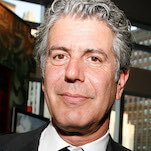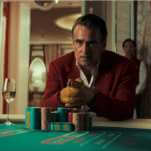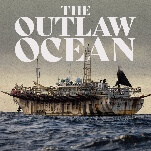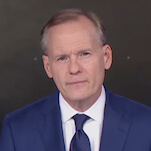Hunter S. Thompson’s legend was so entrenched by the mid-’70s that reading some of the later interviews in Ancient Gonzo Wisdom: Interviews With Hunter S. Thompson, a collection of Q&As assembled by Thompson’s former assistant and widow Anita, can be like reading the earlier ones, except that Thompson is crankier. That’s no surprise: Thompson was the crankiest voice of the ‘60s, laying out explosive visions in lucid, unstoppably funny prose through classic accounts of the Hell’s Angels, the Kentucky Derby, a bender from hell in Vegas, and the 1972 presidential election. Thompson was always the center of the action—he more than anyone is the godfather of modern-day personality journalism, not that he’d want any title he didn’t make up himself. But Thompson seemed trapped by his own persona, especially once Garry Trudeau’s Doonesbury began featuring a caricature of him.
Trudeau is one of the biggest running topics in Ancient Gonzo Wisdom, along with Rolling Stone (Thompson works over publisher Jann Wenner on several occasions in the book, and three of the interviews are from Rolling Stone), Thompson’s delinquent youth, the meaning of Gonzo journalism, and his bête noire, Richard Nixon. Yet as Christopher Hitchens’ introduction points out, Thompson’s commitment to the moment meant he took his responsibility as an interviewee seriously—except when he didn’t, just as he did with journalism. He has some sympathy but little patience with nervous questioners: “God damn, man. Who wrote these questions for you?” he asks a palpably cowed Freezerbox.com contributor in 2004. And yet he responds to David Felton’s belligerent salvos for Rolling Stone College Papers in 1980—“I think it’s generally agreed that you’re pretty much washed up as a writer and a thinker and, to some extent, a human being”—with gentlemanly equanimity: “Hmmm… Jesus. Well, then there’s really no point in doing this, is there?”
Ancient Gonzo Wisdom could have stood to lose a few stray Q&As, particularly during the ‘00s, when Thompson’s resurgent visibility as an ESPN.com columnist sparked new interest. By then, he’d come to accept his notoriety, which helped loose his tendency to conspiracy-theorize about everything from JFK’s assassination to September 11. Still, the best items in Gonzo Wisdom are among the straightest: a gratifyingly sober 1979 confab with Washington Journalism Review, and the classic Playboy interview finished right after Nixon’s resignation. Wild and funny though he was, Thompson was always serious about his writing, and in those two instances, seriousness is the bottom line.









